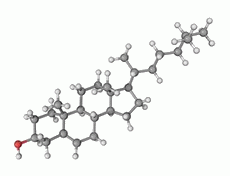The Truth About Cholesterol

Cholesterol. It's a word that everyone must have heard — but almost certainly for the wrong reason.
Because of the propaganda, you can be forgiven for thinking that cholesterol is a harmful alien substance that must be avoided at all costs.
Nothing could be further from the truth.
The truth about cholesterol is that cholesterol is arguably the most important substance in your body.
|
This website contains some of the best-kept secrets about cholesterol. It will explain what cholesterol is, how cholesterol is made, how cholesterol works, why it is better to have a higher level of cholesterol in your body, and what can go wrong if cholesterol is too low. |
Here are 10 facts about the anti-cholesterol campaign:
- According to data published by the World Health Organization, cholesterol levels in different countries have little or no correlation or association with the numbers of heart attacks in those countries. For example:
- The UK has one of the highest rates of heart attacks in the world, yet the average cholesterol level in the UK is below the European average.
- Switzerland has the highest percentage of its population with "high" cholesterol. But despite more than half the population having blood cholesterol over 250mg/dL (6.5 mmol/L), Switzerland has one of the lowest death rates from heart disease.
- Most people around the world who have a heart attack have the same cholesterol levels as those who have not had a heart attack. This has been found to be the case for the US, UK, Australia, and New Zealand.
- The number of people with so-called "high" cholesterol has been going down for a long time, while the number of people who develop heart disease has risen.
- The number of people prescribed cholesterol medications has increased dramatically. Authorities claim that these cholesterol medications save 10,000 lives every year. But this is a predicted estimate. There is no evidence to support this claim: while cholesterol-lowering does appear to have some benefits for a few men, increased life-expectancy is not one of them.
- On the other hand, a number of studies have shown a correlation between higher cholesterol levels and increased life expectancy. This is particularly true of the elderly — despite this age group being the most likely to have heart attacks — and of women. So:
- People with high cholesterol levels tend to live longer than those with low levels;
- although most heart attacks occur after the age of 65, there is no relation between cholesterol and heart attacks at these ages; and
- high cholesterol is not a risk factor for heart attacks in women at any age. Indeed, in women, the total death rate from all causes tends to go down across the whole age range as cholesterol levels rise.
- Cholesterol measurement is unreliable. Cholesterol itself is not measured; only the lipoproteins which carry it and other nutrients round are measured. Then doctors guess how much cholesterol they think they carry. Even then only total and HDL are measured. The rest — LDL, VLDL, IDL, chylomicrons — are estimated.
- Lipoprotein levels can be significantly affected by a number of factors, including, stress levels and how you feel at the time the test is done.
- People with heart disease tend to have lower levels of so called "bad" cholesterol than people without heart disease.
- The threshold for having "high" cholesterol has been progressively reduced, massively increasing the number of people eligible for cholesterol-lowering medications. There is no scientific basis for the "healthy" levels quoted.
- Cholesterol-lowering medications are not as beneficial as we led to believe. What benefits they appear to convey can always be provided by dietary or other means which carry fewer adverse side effects.
- The procedures used in clinical trials, and the way the trials are reported and presented, generally over-hype and exaggerate supposed benefits while underestimating or hiding adverse effects of medications.
Independent articles
The 'Demonisation' of Cholesterol
Top 3 sources of Good Cholesterol
Worried about cholesterol & statins